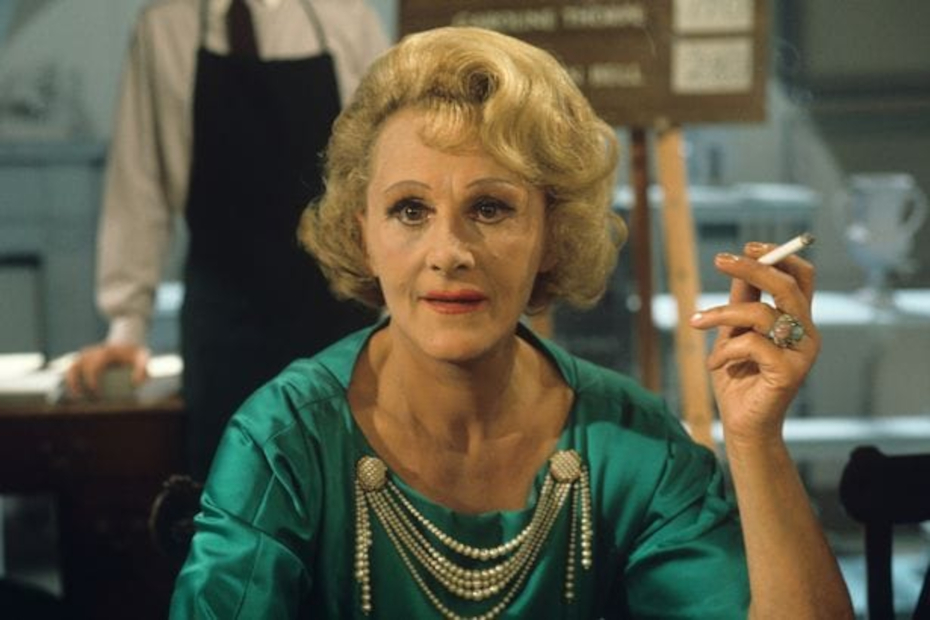Table of Contents:
I am of course referring to the celebrity TV chef Fanny Cradock, at least famous in the UK for not only her cooking, but her brusque manner, her eccentricity and her culinary creations.
I am reminded of her, as the BBC in the UK recently aired her five Christmas cookery shows from 1975. They’re each only fifteen minutes long, but they cover everything from preparing the Christmas turkey, to the Christmas pudding and some nibbles for after the main meal.
A family appointment
I’m finding it difficult to describe our family’s feelings towards Fanny Cradock, without seeming disingenuous or indeed hart-hearted. We (along with many millions of others) absolutely loved watching her on television. She hosted her own cookery shows on the BBC from 1955 to 1975 and went on to become a TV celebrity thereafter – and we watched every single programme of hers. For us, it was appointment viewing, and where possible, we never missed a single programme.
Every time she was on TV, we sat and watched in awe and amusement as she and her “husband” Johnnie concocted weird and colourful culinary delights for us, the viewer. Poor Johnnie suffered a heart attack in the early 1970’s, so his hen-pecked husband persona (for it was just that: the hen-pecked husband and the domineering wife were characters played by Fanny and Johnnie for their live cookery demonstrations or for the cameras) was replaced by a series of assistants. Assistants that sometimes didn’t last for very long, as Fanny got rid of them.
The cooking
It would be fair to say that we didn’t watch it for the cooking. My Mother wasn’t a brilliant cook; which mean that we ate the same things on the same days for most of the time. These were the dishes that she’d cooked over and over again – and had eventually perfected.
No, we didn’t watch Fanny for the cooking. What we watched it for was Fanny herself.
The redoubtable Mrs. Cradock
You’d have to read her full background to get the full story, but Fanny came from a poor background. She worked in restaurants for a while and was introduced to the works of Auguste Escoffier, of whom she became a huge fan.
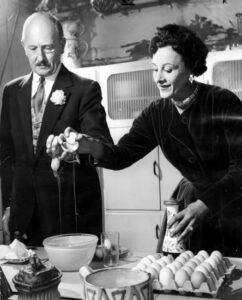
She wrote newspaper articles about food, under the pen-name “Bon Viveur”, which in turn led to a theatre career with her “husband” Major Johnnie Cradock. This is where she created the roles of hen-pecked husband and domineering wife; to amuse the theatre audiences as they cooked their huge elaborate dishes in the Escoffier style. Dishes that were later served to the audience.
When the BBC came knocking at the front door of Major and Mrs. Cradock, they translated their theatre shows to television; maintaining their hen-pecked husband and domineering wife personas – much to my family’s – and the general public’s – amusement. She made twenty-four television series for the BBC, between 1955 and 1975.
The assistants
Johnnie suffered a heart attack in the early 1970’s and was unable to continue making the TV shows. He was replaced by several assistants, some female and some male. Allegedly the male assistants didn’t last very long before being unceremoniously fired.
Now you would think that as Johnnie was no longer assisting, that she would drop the domineering wife persona. But – and much to our amusement – she didn’t. She maintained that brusque, no-nonsense, domineering persona even with her assistants; and continued with it right up until she died.
Of the very few (sadly) remaining episodes of Fanny Cradock’s cookery shows, the Christmas series demonstrates this persona perfectly.
The errant spatula
In episode three of the previously aforementioned Christmas episodes, Fanny is making the Christmas cake. Sarah is her assistant throughout these five episodes and thus far, she has done well.
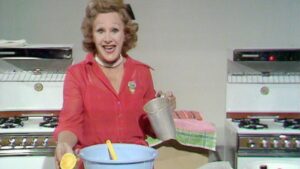
Fanny is mixing with a spatula. She puts the spatula into an empty jug for a moment, a jug which Sarah tidies up.
As Fanny sees Sarah taking the jug away, she lets out what could be described as “nnnnnnnnggggggggaaaaaaaaaaaaaah” and grasps for the spatula, which Sarah very quickly returns. There is a look of fear that crosses briefly over Sarah’s face.
Not even batting an eyelid, Fanny grabs the spatula, turns straight to camera and says “sorry for that noise” and carries on (without missing a beat) with the recipe.
These moments were why we as a family watched her cookery programmes. This was amusement at it’s very best (remember it was 1975!).
A pioneer
For all her brusqueness and eccentricities (her clothing and makeup got more and more extreme as she got older) she was a pioneer in the true sense of the word. She was one of the first people to present a cookery show on television, let alone female. She has been oft quoted as the inspiration behind many chefs that followed: Delia Smith and Keith Floyd to name but two.
No matter what she appeared on, we continued to watch her – because we loved her. She would dress in the fanciest of dresses, proclaiming that you didn’t have to wear aprons or gloves to cook. You could quite easily cook Escoffier-standard food without any unnecessary fuss, or frivolities.
She was also one of the first people on television to be very cost-conscious. At a time when Britain was in the grip of strikes and austerity, she correctly assumed the majority of her viewing public would be watching their pennies, as many families struggled to generate income in that era. She would often substitute cheaper ingredients for her recipes, telling the viewers that you really didn’t have to buy the most expensive ingredients to get a good product.
Then in 1976, Fanny was cancelled.
Gwen Troake
In 1976 Gwen Troake, a farmer’s wife from Devon, won the Cook of the Realm competition, leading to the BBC selecting her for its TV series The Big Time, where talented amateurs were given the opportunity to take part in a spectacular professional event. Troake was to organise a three-course Foyles’ Literary Lunch at The Dorchester in honour of the former prime minister Edward Heath, with Earl Mountbatten of Burma and other dignitaries in attendance, and asked Cradock (by then a tax exile in Ireland) and many other experts Troake admired to advise her.
Troake went through her menu of seafood cocktail, duckling with a lemon-jelly-and-cornstarch fortified bramble sauce and coffee cream dessert with rum. Her idea was that with seafood, water fowl and rum, the meal had a nautical theme, which would appeal to Heath’s love of sailing and also be an appropriate salute to the former Admiral Mountbatten. Cradock, grimacing and acting as if on the verge of gagging, told Troake that her menu was far too rich and she would “never in a million years” serve a seafood cocktail before duck. She appeared not to be familiar with the term “bramble”, and when told it meant a blackberry, was horrified that it would be paired with a savoury duck, remonstrated that a sauce like that should be brushed on a flan. She derisively declared that the jam in it was “too English” and that the English had never had a cuisine, erroneously claiming that “Yorkshire pudding came from Burgundy”. While accepting that Troake’s dessert was delicious, she insisted that it was not suitable, as it was “too sickly” served after the sweetly sauced, rich duck, countering Troake’s numerous objections with “Yes, dear, but now you’re among professionals.”
Cradock suggested that unless Troake were to serve salad and cheese afterwards, as is done in France, then she should use small almond pastry barquettes filled with a palate-cleansing fruit sorbet with spun sugar sails, as this was equally suitable for the naval theme. Troake kept insisting that she liked her signature coffee pudding with “nautical” rum in it, while Cradock appealed to her to think of her diners’ taste buds and stomachs, and try to achieve a balance in her menu. Unfortunately, the replacement dessert was not executed properly, and Morley said he felt that Troake’s original coffee pudding was perfect.
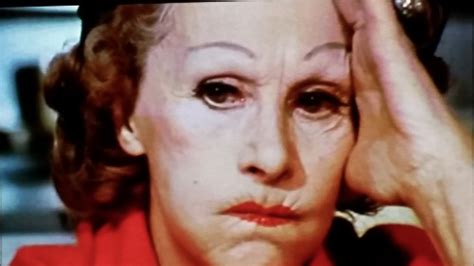
The public were incensed at Cradock’s eye-rolling rudeness and condescension, and felt that she had ruined Troake’s moment. The Daily Telegraph wrote “Not since 1940 can the people of England have risen in such unified wrath”. Fanny wrote a letter of apology to Troake, but the BBC terminated her contract two weeks after the broadcast of the programme. She would never again present a cookery programme for the BBC. (Troake, by contrast, published Gwen Troake’s Country Cookbook of recipes the following year; it included the bramble sauce as well as the coffee cream dessert Cradock had vetoed.)
Speaking about the incident on Room 101 in 1999, The Big Time’s producer Esther Rantzen described Cradock as “hell on wheels”, and that she had “reduced this poor little lady to nothing”.
My family and I witnessed the whole thing on national television. Some of us with amusement, some of us with sorrow and some of us with horror, as we all realised that this could be an end to our Fanny. Indeed, the BBC never renewed her contract and she never presented a cookery show on BBC TV again.
A TV celebrity
The “Gwen Troake” incident, horrific though it was, was Fanny being Fanny. By the time 1976 came around, she had become a little more eccentric and I think she truly believed the persona that she had invented. Unfortunately, at the time, Fanny being Fanny just wasn’t acceptable, so she was – in today’s parlance – effectively “cancelled” and became nothing more than a subject of ridicule.
She became something of a TV celebrity, however, appearing on chat shows and game shows, the hosts always wanting Fanny to be Fanny and provide amusement for the general public. As long as she didn’t interact with the general public, that would be OK.
As a family, we kept up with watching her appearances on TV. It was actually quite sad to witness her decline in her later years, until eventually, she was no longer a guest on Celebrity Squares, or chatting on Terry Wogan’s chat show.
We still loved her though and totally at odds with her 1976 faux pas, the public now loved her too, but for the wrong reasons.
Fanny goes on!
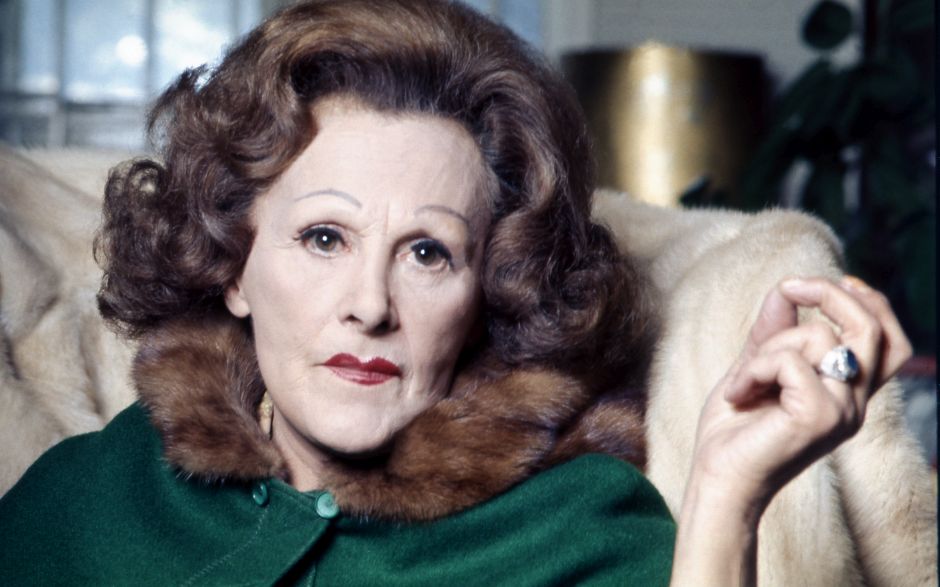
Fanny died on 27th December 1994 in a nursing home in Hailsham. Her death was reported widely and obituaries came flying out from all sorts of places. There was a lot of affection for this deeply eccentric woman, an affection that continues to this day: The BBC airs her Christmas Cookery shows every year!
While very few of her actual cookery shows remain, a few docu-dramas and documentaries have been made about her. Her cookery books are still in print and I believe that you can still get her recipe leaflets from the BBC.
One such docu-drama that I’d recommend is the BBC-made programme “Fear of Fanny”. It’s a hilarious insight into a period of Fanny’s life, featuring Julia Davies as Fanny and Mark Gatiss as the ever-suffering Johnnie. If you cand find it, watch it.
Some Fanny links:
Her Wikipedia page.
This is an excellent website that is run by a Fanny Cradock fan – Kevin. Kevin has a huge amount of information, blogs and even Fanny’s recipes on his site.
“Fear of Fanny” is about to be repeated on BBC Four in the UK on Thursday 23rd January 2025. It’ll no doubt hang around on the BBC iPlayer thereafter. It’s also on YouTube in its entirety.
There are a good deal of Fanny’s cookery books still in print, no doubt available at your usual bookshop.
https://www.youtube.com/results?search_query=Fanny+CradockYouTube has an amount of clips and full programmes of both Fanny’s cookery shows and her chat show appearances.

